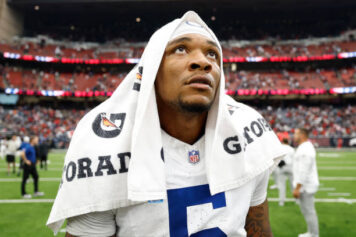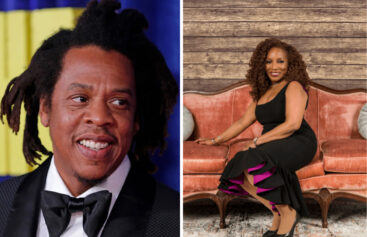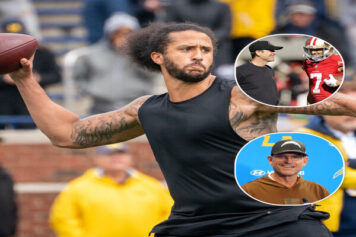A history of criminal infractions and bizarre behavior didn’t stop the Colts from signing Jim Kelly’s nephew.
The NFL has been aggressive in pursuing and punishing African-American players that kneel for the National anthem in protest of police brutality and social injustice, speak out in support of Colin Kaepernick, or get into any kind of domestic altercation that may involve violence towards women.
In other words, good or bad, Black NFL players are a target of the league and white players seem to receive with more leniency for their off the field transgressions.
In a league that insists that it cares deeply about its image, the NFL’s Indianapolis Colts have oddly signed embattled and unproven quarterback Chad Kelly.
This Tweet from activist Shaun King exposes Kelly’s riddled past.
https://twitter.com/shaunking/status/1130478820019064832
Kelly, a seventh-round pick of the Broncos in 2017, was released by Denver last October after he was arrested for trespassing inside a woman’s home after a Halloween party at a teammate’s house. He pleaded guilty and was sentenced to one year of supervised probation and 50 hours of community service.
Kelly was also involved in an altercation outside a nightclub in Buffalo in 2014 (criminal charges were later dropped after Kelly pleaded guilty for disorderly conduct) and he transferred from his first collegiate stop, Clemson, after getting into an argument with the coaching staff during a game.
Despite his litany of negative actions, Kelly, the nephew of legendary Bill run-n-shoot maestro Jim Kelly, has never been suspended. Meanwhile, Kaepernick is still unemployed.
You're gonna let this jabroni play but not @Kaepernick7? Oh, okay. Every day pro sports teams have an opportunity to change the culture of toxic masculinity but instead they choose to be a stagnant pool of it. #ChadKelly https://t.co/uB8uOvDdne
— Padma Lakshmi (@PadmaLakshmi) May 20, 2019
An NFL spokesman said Kelly’s situation is under review. Under the NFL’s personal conduct policy, the league can suspend players for off-the-field conduct. The league, which has been dispensing quick and harsh punishment on African-American players with lesser offenses, don’t seem too eager to make an example out of Kelly.
I wonder why?
There have been many instances where the police have investigated a situation and didn’t find enough evidence to even press charges, but after conducting its own internal investigation, the NFL levied hard penalties. These circumstances almost always involve young, African-American players.
Ray Rice never played again after the explosive video of him punching his wife in an elevator emerged.
When the Redskins signed Reuben Foster on the heels of a supposed domestic violence incident involving his girlfriend, all hell broke loose, Folks wanted to tie Redskins legend and player personnel head Doug Williams to the stakes for signing Foster, despite the fact that prosecutors in Tampa, Fla., decided in January not to pursue a domestic violence case against Foster, 25, dismissing a first-degree misdemeanor battery charge.
Redskins' Doug Williams: Reuben Foster issues are 'small potatoes.' https://t.co/WoftK6vbmK pic.twitter.com/zzDY3MxoL5
— theScore (@theScore) November 29, 2018
The backlash against the Redskins was real. Stronger than the fan backlash against the racist Redskins logo that is long overdue for a change.
The NFL spent over a year investigating domestic violence allegations raised by Dallas Cowboys star Ezekiel Elliott’s scorend former girlfriend in Columbus, Ohio.
She filed police reports and went to the Columbus City Attorney’s office to pursue charges in July 2016. The cops investigated and Elliot was never charged with a crime. However, the NFL wanted blood and suspended him based on the fact that the “Accusation” did not portray him or the league in a favorable optic.
It probably cost the Cowboys a shot at the Super Bowl.
Kansas City Chiefs talented running back Kareem Hunt was the latest victim of the NFL’s double standard. Back in March, video emerged of him pushing and kicking an out of control, highly aggressive white woman who he met at a bar, invited back to his room and then called him a “Nigger” after he asked her to leave once she revealed she was just 19-year-old.
Hunt was labeled a woman abuser, released from the Chiefs, fried by media and then suspended 8 games by the NFL before signing with the Cleveland Browns.
It probably cost the Kansas City Chiefs a Super Bowl.
Back in 2013, white Eagles wide receiver Riley Cooper was caught on video dropping the N-word and threatening to “fight every nigger in here,” when a black security guard denied him backstage access at a Kenny Chesney concert.
Cooper dealt with some temporary public backlash and offered a few weak apologies via Twitter.
Was wrong and I will accept the consequences.
— Riley Cooper (@RileyCooper_14) July 31, 2013
The Eagles fined him, but the NFL let it rock and did nothing. If the league ever showed what they thought of their Black players it was in that instance back in 2013, years before Kaepernick finally took a stand and was martyred for it.
Behavior that violates the league conduct policy should be punished, but the NFL needs to keep that same energy it uses to punish its African-American rules violaters when reprimanding the league’s white offenders.



